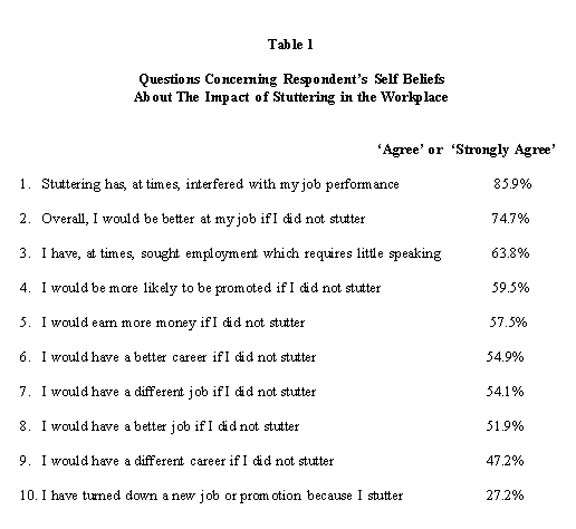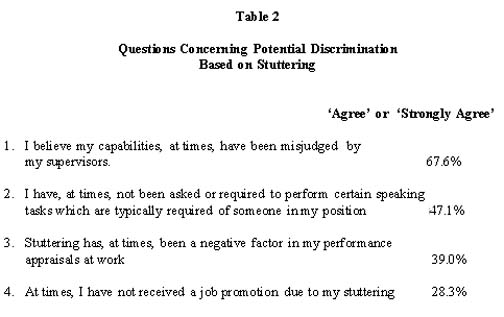The Impact of Stuttering at Work: Challenges and Discrimination
 |
About the presenter: Dr. Marshall Rice is Associate Professor of Marketing at the Schulich School of Business at York University in Toronto, Canada. Dr. Rice has published over 30 papers in scholarly journals and has presented his research at conferences in China, Japan, Singapore, Scotland, Finland and Germany. He has conducted research on the impact of stuttering in the workplace for 10 years and has presented his work at the World Congress on Fluency Disorders. |
 |
About the presenter: Robert Kroll is the Director of the Stuttering Centre and the Co-Executive Director of the Speech Foundation of Ontario. Bob obtained his Masters in Speech Language Pathology at McGill University, Montreal Canada, and his Ph.D. at Bowling Green State University in Ohiuo,USA. Bob introduced one of the first specialized and intensive programs for stuttering to Canada in the mid 1970's and presently sees clients from all over the country and beyond. Bob is also an adjunct professor at the University of Toronto. |
The Impact of Stuttering at Work: Challenges and Discrimination
by Marshall Rice and Robert Kroll
from Canada
Previous research has shown that people who stutter face challenges in the workplace (Klein & Hood, 2004; Rice and Kroll, 1994). Specifically, studies have shown that people who stutter perceive that their stuttering has a negative impact on their employability, job performance and career advancement. In this study, we surveyed the attitudes and opinions of 412 people who stutter worldwide. Results show that people who stutter in all countries face significant challenges at work and instances of discrimination.
Introduction
Many research studies have shown that people who stutter face challenges in the workplace. Specifically, research has shown that people who stutter are viewed as being less competent than non-stutterers (Silverman and Paynter, 1990), vocationally handicapped (Hurst and Cooper, 1983), less promotable (Rice and Kroll, 1994; Perott, 1994), negatively assessed by superiors/employers (Hohmeier, 1985) and subject to discrimination the workplace. Finally, in recent large-scale study, Klein and Hood (2004) surveyed 232 members of the National Stuttering Association in the United States and found that the respondent's believe that stuttering has a negative impact on their employability and job performance.
In the research reported here, we replicate the Klein and Hood study but with a more representative, international sample. In addition, this research study asks respondents additional questions about instances of discrimination that they might have faced in the workplace. The current study examines 412 people who stutter worldwide and includes both those who have been, and have not been, members of self-help groups.
1.1 Participants
Respondents were 412 people who stutter who completed an online (Web-based) survey to assess the impact of stuttering in the workplace. An online survey was utilized as this was the only method that could reach respondents in multiple countries in an economical way. The survey asked about 14 issues related to stuttering in the workplace.
Respondents were recruited to complete the online survey in a number of different ways. These included:
- Posting invitations and URL link to the survey on popular newsgroups for people who stutter (for example, Stutt-L and Stuttering Chat).
- Posting a survey invitation on Web sites commonly visited by people who stutter (for example, the National Stuttering Association Web site and The Stuttering Home Page Web site).
- By including a survey invitation and link in newsletters distributed to people who stutter (for example, in the newsletter of the British Columbia Association of People who Stutter).
A total of 173 respondents of the 412 respondents (42%) were from countries outside of the United States. The countries with the largest sample sizes were as follows: United States (239 respondents), Britain (64 respondents), Canada (32 respondents), Australia (24 respondents) and India (13 respondents). Overall, respondents from 32 countries participated in this research study.
The sample consisted of 295 males and 115 females (2 respondents did not self-declare). In addition, respondents came from a variety of age ranges as follows: 19% of respondents were 18 - 25 years old, 36% were 26-35, 20% were 36-45, 16% were 46-55, 8% were 56-65 while 1% were over 65 years old. Finally, a wide range of people with different stuttering severity responded to the survey. Results were as follows: mild (39%), moderate (54%) and severe (7%).
The survey asked respondents questions about the respondent's personal experiences and opinions being a person who stutters in the workplace. All question used a five point scale question with the following anchors (1= strongly disagree, 2 = disagree, 3 = neutral, 4 = agree, 5 = strongly agree).
2. Results
2.1 Impact of Respondent's Stuttering in the Workplace
Table 1 shows the respondent's answers to 10 statements about the impact of their own stuttering in the workplace. For reporting purposes, agreement indicates that the respondents either 'agreed' or 'strongly agreed' with the statement. Similarly, disagreement with the statement indicates that the respondent either 'disagreed' or 'strongly disagreed' with the statement.

Overall, the results of the survey show that respondent's believe that stuttering has a significant negative impact on their workplace experience. For example, a total of 85.9% of respondents agreed with the statement that 'Stuttering has, at times, interfered with my job performance'. Approximately three-quarters of respondents (74.7%) agreed with the statement 'Overall, I would be better at my job if I did not stutter.' Approximately half of the respondents (51.9%) agreed with the statement 'I would have a better job if I did not stutter.'
It appears that the impact of stuttering has a negative impact in two broad areas/factors. First, the results in Table 1 show that respondents who stutter face limitations in the workplace due to their own actions. For example, approximately 64% of respondent's agreed with the statement 'I have, at times, sought employment which requires little speaking'. In addition, 27.2% of respondents 'turned down a new job or promotion' because of their stuttering. These results indicate that many stutterers hold themselves back from employment opportunities. Secondly, the data also show that stutterers face challenges in the workplace due to the actions of employers. For example, 59.5% of respondents agreed with the statement 'I would be more likely to be promoted if I did not stutter'.
Statistical analysis was used to determine if the respondent's level of severity of stuttering had an impact on the respondent's perceptions of the impact of their stuttering in the workplace. The statistical analysis showed that the level of stuttering the respondent had correlated strongly with their degree of the negative impact about their stuttering. That is, as the person's severity of stuttering increased, the negative impact of stuttering in the workplace also increased.
2.2 Discrimination in the Workplace
The survey also asked respondents four questions about incidences of potential discrimination in the workplace due to their stuttering. Results are as follows:

As seen in Table 2, people who stutter face challenges in terms of discrimination in the workplace. Approximately two-thirds of the respondents (67.6%) agreed that their 'capabilities have been misjudged by their supervisors'. Almost one-half of the respondents (47.1%) agreed with the statement that, at times they have 'not been asked or required to perform certain speaking tasks which are typically required of someone in my position'.
Perhaps most disturbing is the finding that 28% of the respondents reported that, at times, they have not received a job promotion due to their stuttering. This finding points to significant discrimination and challenges faced by people who stutter.
3. Conclusions
This research study shows that people who stutter in countries worldwide believe that stuttering has a negative impact on their employability, job performance and career advancement. In some cases, the challenges facing stutterers in the workplace appear to be caused by their own behavior. Specifically, the data show that people who stutter seek employment that requires little speaking or have turned down a new job or promotion because of their stuttering. However, people who stutter also face challenges in the workplace due to the actions of employers. For example, people who stutter believe strongly they would be more likely to be promoted if they did not stutter. Finally, people who stutter face significant discrimination in the workplace with a number of respondents indicating that they have not received promotions due to their stuttering.
These findings indicate the need for improved education, therapy and assistance for people who stutter to succeed in the workplace. In addition, efforts must be undertaken to help eliminate discrimination against people who stutter in the workplace.
References
Hohmeier, Jurgen. (1985). On the vocational situation of people who stutter. Full report published in 'Der Kieselstein'
Hurst, Melanie I. and Cooper, Eugene B. (1983). Employer Attitudes Toward Stuttering, Journal of Fluency Disorders, 8, 1-12.
Klein, J & Hood, S. (2004). The impact of stuttering on employment opportunities and job performance. Journal of Fluency Disorders, 29, 255-273.
Perott, Richard (1994). Association for Stammerers Survey. Reported by the European League of Stuttering Associations.
Rice, M. & Kroll, R (1994). A survey of Stutterers perceptions of challenges and discrimination in the workplace. In C.W. Starkweather & H.F.M Peters (Editors), Proceedings of the First World Congress on Fluency Disorders, 559-562.
Silverman, Franklin H. and Paynter, Kathryn K. (1990). Impact of Stuttering on Perception of Occupational Competence. Journal of Fluency Disorders, 15, 87-91.
After the conference threaded discussion is no long accessible, additional correspondence about this paper can be addressed to:
Professor Marshall Rice, Ph.D.
Schulich School of Business
York University
4700 Keele Street
Toronto, Ontario, Canada
M3J-1P3
416-736-2100 (ext. 58241)
mrice@schulich.yorku.ca
August 15, 2006

